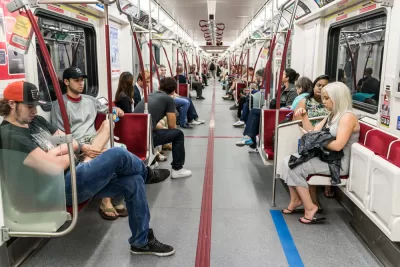A discussion of private and public space, revealing an argument for justice.

Density matters.
Which is why cities matter.
We exist physically; we go places and do things bodily, and the likelihood we're going to run into other people to generate new things in new combinations is vastly improved by the density that characterizes cities—in densities that are configured to be more conducive to sociability.
There can be too little density, or too much. No one knows what the right amount is. It's not a science—even if there's a tendency to put numbers to floor area ratio or people/jobs/units per hectare in a bylaw, but you must start from something. There's better density—but a plethora of cities fail that test, yet are loved by its residents.
Some might say the internet has made cities less relevant. Social media does facilitate all sorts of long-distance interactions and acquaintances that otherwise would never be, but they tend to be based upon mutual similarities of pre-established personal characteristics and interests, and actively pursued through those commonalities. The web tends to orient us toward what we're looking for. We're fed what we want to be fed.
Conversely, encounters in socially-oriented, densified cities offer far more happenstance opportunities, and thus far more likely to bring differences into contact and interplay. Cities bundle culture-making people and peoples (what we're intended to be), which can lead to novel creations. Bundling is supposed to spawn further cultural manifestations, and mutation. That's assuming there's any difference among us; hence the culture(s) of the city, the people it attracts, and whether it encourages or discourages certain activities, certain behaviours, certain expressions.
A dense city, can nonetheless reduce our differences so central to creation. Consider the precipitously declining cultural vitality of those cities undergoing such rapid and extreme gentrification that they are effectively banishing the presence of all but a narrow class of like-minded privileged inhabitants, meaning density becomes nothing more than opportunities for same to encounter same. Provided there's people there at all. Some cities, or parts of cities aren’t even for people anymore, but rather an even more privileged class of non-people called capital (Vancouver? San Francisco? London?).
Just as the culture of a city can be so socially-averse, since being social invariably entails a willingness to encounter and accommodate the unfamiliar, as to dissuade new combinations and creation, resulting in a culturally enervated density where sure, people cross one-another's paths, but they don’t interact much upon doing so and don’t have much to share when they do.
"How are you?"
"Busy."
All the right density in the developer’s bottom-line won't make for an interesting urban culture when those densely clustered together in starchitect/gold plated buildings aren't themselves interesting or, more commonly, are dissuaded from having or sharing interests.
Steven Snell is a professional urban planner focusing on biodiversity conservation. He has a master’s degree in urban design and is a novelist of The Undergraduates. Connect with him on Twitter @stevenpsnell or Facebook stevenpsnell. The views expressed are purely those of the writer and may not in any circumstances be regarded as stating a position of his employer.

Alabama: Trump Terminates Settlements for Black Communities Harmed By Raw Sewage
Trump deemed the landmark civil rights agreement “illegal DEI and environmental justice policy.”

Planetizen Federal Action Tracker
A weekly monitor of how Trump’s orders and actions are impacting planners and planning in America.

How Atlanta Built 7,000 Housing Units in 3 Years
The city’s comprehensive, neighborhood-focused housing strategy focuses on identifying properties and land that can be repurposed for housing and encouraging development in underserved neighborhoods.

In Both Crashes and Crime, Public Transportation is Far Safer than Driving
Contrary to popular assumptions, public transportation has far lower crash and crime rates than automobile travel. For safer communities, improve and encourage transit travel.

Report: Zoning Reforms Should Complement Nashville’s Ambitious Transit Plan
Without reform, restrictive zoning codes will limit the impact of the city’s planned transit expansion and could exclude some of the residents who depend on transit the most.

Judge Orders Release of Frozen IRA, IIJA Funding
The decision is a victory for environmental groups who charged that freezing funds for critical infrastructure and disaster response programs caused “real and irreparable harm” to communities.
Urban Design for Planners 1: Software Tools
This six-course series explores essential urban design concepts using open source software and equips planners with the tools they need to participate fully in the urban design process.
Planning for Universal Design
Learn the tools for implementing Universal Design in planning regulations.
Caltrans
Smith Gee Studio
Institute for Housing and Urban Development Studies (IHS)
City of Grandview
Harvard GSD Executive Education
Toledo-Lucas County Plan Commissions
Salt Lake City
NYU Wagner Graduate School of Public Service



























